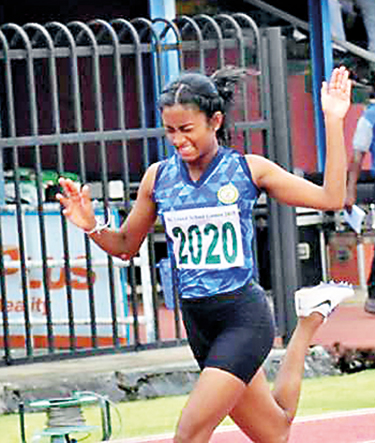Chelsea freed from doping ban
 Teenage sprinter Chelsea Melani Bendarage who tested positive for a banned stimulant in February this year has been exonerated from all charges on a technicality but a reprimand has been recommended.
Teenage sprinter Chelsea Melani Bendarage who tested positive for a banned stimulant in February this year has been exonerated from all charges on a technicality but a reprimand has been recommended.
Chelsea, who tested positive for the stimulants Oxandrolone and Epioxandrolone (metabolite of Xandrolone) at the National Sports Festival last year, was cleared after a disciplinary hearing this week by the Sri Lanka Anti-Doping Agency’s (SLADA) disciplinary panel.
Chelsea’s A sample resulted in an adverse finding on February 5 this year, four months after SLADA collected the urine sample. The B sample also confirmed the presence of the adverse analytical finding.
However, Chelsea and her parents have successfully established that they bear no fault or negligence in consuming the Protein Supplement, Nitro Tech, which caused the adverse analytical finding, resulting in her being exonerated.
“Therefore, considering the peculiar circumstances of this case, taking into consideration of all the evidences, explanation, and arguments submitted by both parties, and for reasons set out above, this Panel is satisfied that the athlete and/or her parents have successfully established that they bear no fault or negligence in consuming the said protein supplement which caused the adverse analytical finding,” the 18-page report prepared by the three-member committee headed by President Counsel Uditha Egalahewa reads.
Others in the committee are Prof. Rohini Fernandopulle and Dr. Nimal Gunaratne.
The decision is purely based on technical grounds, as the athlete and her parents have not contested the presence of banned substances in her body but flagged a procedural violation at the time of urine sample collection and an ignorance of the presence of banned substances in the supplement used by the athlete and her parents.
The athlete’s party has maintained that they purchased the same supplement that was on sale during the All Island School Games Athletics Championship at the Sugathadasa Stadium, assuming the product was safe as it was sold during a Sports Ministry organized sports event.
According to the report samples of supplement sold at the Sugathadasa premises and also the one that Chelseas father was analysed by National Narcotic Laboratory of the National Dangerous Drugs Control Board and it had confirmed that both products contained the banned substances. This begs the question as to why the Sports Ministry allow the sale of the product with banned substances at the venue.
“It is evident from the unchallenged or uncontested testimony of the minor athlete’s father than (sic) he had bought same and/or similar brand of protein supplement which was sold at the premises of the All Island School Games Athletics Championship meet which was conducted by the Ministry of Sports,” the report holds.
“This Panel acknowledges the reasonableness in the father of the athlete assuming the safety of the product as it was sold inside the premises of a national tournament organised by the Ministry of Sports. This Panel notes that Protein Supplements are a popular nutritional supplement, which is taken as part of the diet and are not considered performance enhancing substance per se.”
The athlete has successfully established that the SLADA has violated the article 5.5 of the WADA code which says that, “All testing shall be conducted in conformity with the international standard for testing and investigations’ by failing to inform the athlete of her rights and responsibilities prior to the collection of the sample.” The report also holds SLADA responsible for the procedural impropriety alleged by the athletes by not notifying the athletes of the her rights and responsibilities of the athletes.
“This Panel observes that the form submitted by SLADA is identical to the first page of the sample form of WADA, although the SLADA form is in only English,” it states.
“However, the SLADA form does not contain the second page which stipulates the rights and responsibilities of the athlete, which is a mandatory requirement under Article 5.5 of the WADA Code read along with the ISTI. In addition, it is evident from the testimonies before this Panel that the rights and responsibilities of the athlete has not even been conveyed verbally let alone in writing to the minor athlete and/or her mother who was present.”
A doping rule violation warrants a minimum four-year ban according to WADA rules as it’s the personal duty and responsibility of each athlete to ensure that no prohibited substance enters his or her body and the decision may land SLADA in trouble once again.
Sri Lanka paid a fine of Euros 4000 after WADA challenged a decision to impose a reduced suspension of eight months on female weightlifter Dilshani Abeysekera following an adverse finding as she was a minor at the time of doping rule violation. WADA, whichrefused to accept the SLADA decision, challenged it in the Court of Arbitration for Sports (CAS). Given the huge costs involved, Sri Lanka withdrew and WADA imposed a hefty fine on SLADA.
“We will be sending the disciplinary committee decision to WADA,” said Prof Arjuna de Silva, SLADA Chairman.
“They will then study the report and see whether there are satisfactory grounds to exonerate the athlete. If they are not satisfied then, they will file action with CAS. If the parents can afford to challenge it there, they can do so, but we certainly don’t have money to do that. If we don’t challenge it, we will end up paying a fine which is Euros 8000 now.”


